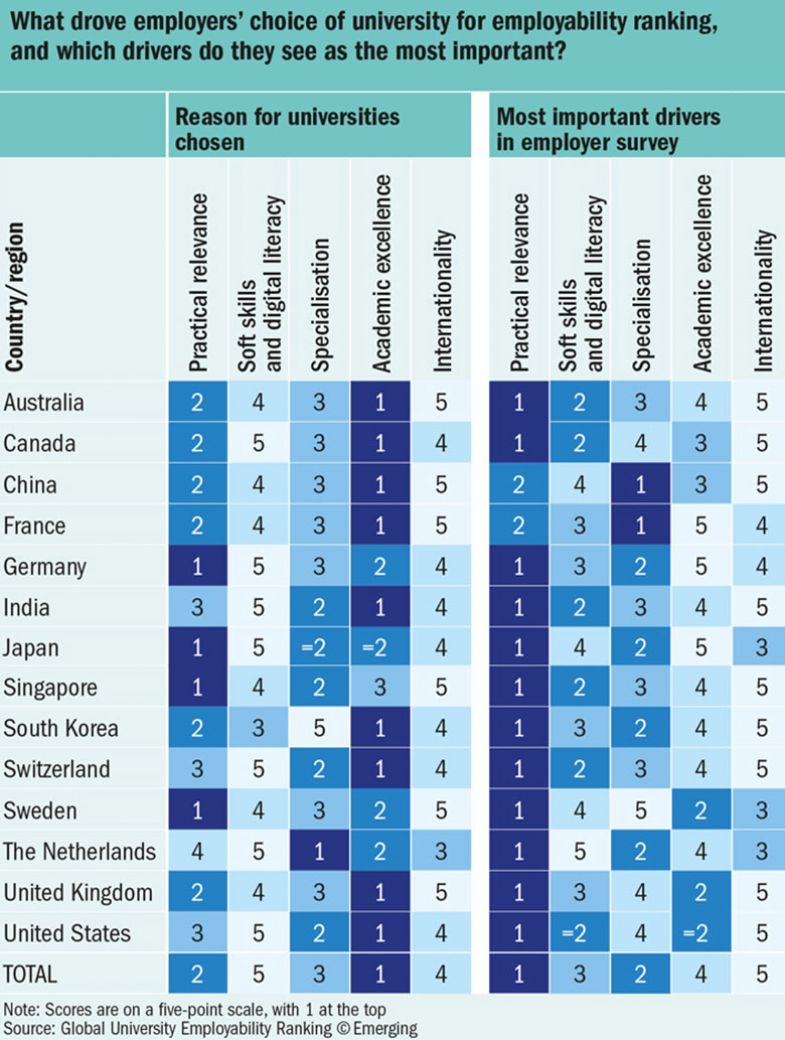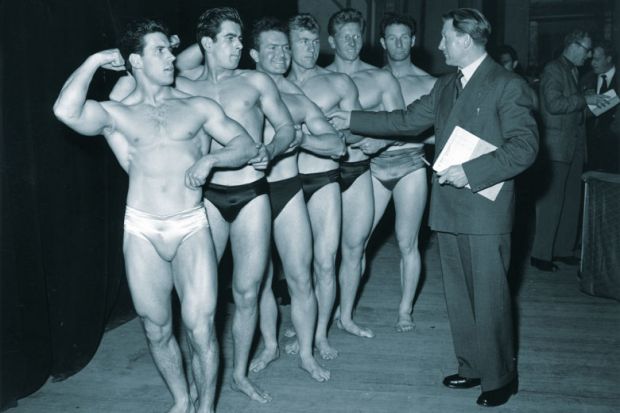The importance of academic reputation in driving where students study, where researchers want to work and how employers recruit graduates is often hard to overstate.
Universities that tend to top world rankings have reputations that have been honed over decades, if not centuries.
But an analysis of the 2019 Global University Employability Ranking, produced by Paris-based HR consultancy Emerging and published by Times Higher Education, suggests that, at least when it comes to employers, academic reputation can become a secondary factor in recruitment once they know an institution is producing graduates with the skills they need.
For this year’s ranking, when graduate recruiters were asked to select universities in their country and around the world that they felt had the most employable graduates, they were also asked the main reason for making that decision out of five factors: practical relevance; soft skills and digital literacy; specialisation; academic excellence; and internationality.
Although academic excellence was the most popular reason chosen by employers in most countries, there were notable exceptions among nations with a number of highly ranked institutions.
For instance, employers in Germany and Singapore saw practical relevance as the key driver; in the Netherlands it was specialisation (something that in Singapore was the second most popular driver, pushing academic excellence into third).
Furthermore, when employers were asked in a separate survey question to score each driver for its perceived importance when recruiting, academic excellence tended to come further down the priority list, with practical relevance almost universally seen as most important.
Good start: where ‘most employable’ graduates study
|
2019 Global University Employability Rank |
2018 rank |
University |
Country/region |
Position in THE World University Rankings 2020 |
|
1 |
1 |
United States |
7 |
|
|
2 |
2 |
United States |
2 |
|
|
3 |
3 |
United States |
5 |
|
|
4 |
4 |
United Kingdom |
3 |
|
|
5 |
5 |
United States |
4 |
|
|
6 |
6 |
Germany |
43 |
|
|
7 |
9 |
University of Tokyo |
Japan |
=36 |
|
8 |
7 |
United States |
6 |
|
|
9 |
8 |
United States |
8 |
|
|
10 |
16 |
Hong Kong University of Science and Technology |
Hong Kong |
47 |
|
Source: Global University Employability Ranking © Emerging |
See here for full 2019 Global University Employability Ranking
Laurent Dupasquier, associate director of Emerging, said that the difference between the drivers that influenced choices in the rankings and those factors that employers viewed as most important overall was possibly a result of firms falling back on reputation when they knew less about individual institutions, particularly when thinking about the best universities for employability internationally.
But he added that the fact academic excellence was still not the most important driver in some countries suggested that firms in some nations had a very different relationship with higher education.
In the Netherlands, for instance, the degree of specialisation in a university was most likely to drive the choices; this was also an important driver in Singapore and Switzerland.
Mr Dupasquier pointed out that Dutch firms were very involved in institutional strategy in the Netherlands and that helped to align local employers’ needs with the courses offered at a particular institution.
“[Companies] are involved in the governance and the curriculum probably more than in most other countries,” he said, while a “cluster strategy” in regions ensured a focus on different industries in each area.
However, at the same time the Dutch economy was also very internationalised and this combination of specialisation and internationalism seemed to be a winning package.
“We have seen a steady rise in the number of Dutch universities and their placings” in the employability ranking, Mr Dupasquier said.
Meanwhile, one country that has seen its overall performance slip in recent years is the UK, a nation where academic excellence still seems to be central to the choices of employers in recruitment.
According to another question in the employability survey, UK firms are far ahead of any other country in making the university attended by a graduate the main criterion when recruiting. In Switzerland, for instance, just 18 per cent of recruiters see the university as the main reason for choosing candidates, and 48 per cent say that skills and experience are the central focus.
Mr Dupasquier said that within the UK, employers still seemed largely satisfied with the higher education system, but this may be because they were used to a system where they already expected to train new university leavers through initiatives such as graduate programmes.
“For British employers, it is normal [to see] universities as providing graduates who are well-prepared but not automatically ‘ready to work’,” he said.
However, outside the UK and for recruiters who have previously worked abroad, there seemed to be a shift away from relying on academic reputation to guide them towards the best candidates. Instead, they were looking increasingly for universities that produced graduates who were both highly skilled in specialist areas – and especially digitally literate – but also incredibly adaptable.
“There has been a change in definition in terms of the ‘ready to work’ graduate,” said Sandrine Belloc, managing partner at Emerging. “The ‘ready to work’ graduate [now] is a specialised person but with the skills to adapt. And recruiters count more and more on higher education to do that.”
Global consensus: Practical relevance is prized

As a result, the universities that relied only on academic reputation to do well on employability would face a challenge in the future, she said.
“Employers still appreciate the traditional [academic] role of universities,” she said, but those institutions that maintain this without thinking about what businesses want “will definitely lose ground”.
Mr Dupasquier added that this could even be one of the explanations why UK universities seemed to be falling back in the employability ranking. Overall, the country has 10 universities in the top 150, the same number as last year, but most fell several places or stayed in the same position.
Of the three institutions that have climbed in the top 150, two are specialists – the London Business School and the London School of Economics – and a notable new entrant in the top 250 is Bournemouth University, an institution that has made global employability a focus of its strategy.
“Perhaps the decline of UK universities in the last few years is not only because of Brexit. Maybe it is also linked to the fact that people voting in our ranking are really voting on employability and less on reputation,” Mr Dupasquier said.
Find out more about THE DataPoints
THE DataPoints is designed with the forward-looking and growth-minded institution in view
Register to continue
Why register?
- Registration is free and only takes a moment
- Once registered, you can read 3 articles a month
- Sign up for our newsletter
Subscribe
Or subscribe for unlimited access to:
- Unlimited access to news, views, insights & reviews
- Digital editions
- Digital access to THE’s university and college rankings analysis
Already registered or a current subscriber? Login








